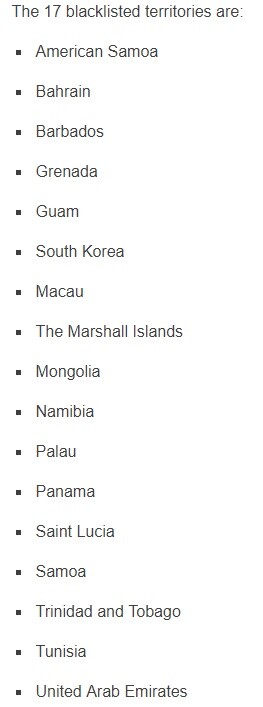hankyoreh
Links to other country sites 다른 나라 사이트 링크
[Editorial] South Korean government idly sits by as country is unfairly deemed a “tax haven”

South Korea was included on the first blacklist of tax havens published by the European Union (EU). South Korea was the only OECD member state among the 17 territories on the list. There is no denying that this is an international disgrace. While there are many questionable aspects of the EU’s decision, what is even more stupefying is the pathetic diplomatic efforts of the South Korean government, which failed to prevent the country’s designation as a tax haven despite the lack of any justification for that label.
The EU categorized 17 countries, including South Korea, as “uncooperative regions” and placed an additional 47 countries that had agreed to change laws that ran afoul of the EU’s tax requirements on a gray list of “countries to watch.” None of the countries in the EU were included on the list. The EU did not announce any plans to impose sanctions on the countries on the blacklist, but appearing on the list at all damages South Korea’s credibility.
The EU apparently made this decision because it regards the corporate tax concessions that South Korea provides for five to seven years to foreign investors in free economic zones and foreign investment zones as being a “harmful preferential tax regime.” If this explanation is correct, the EU’s decision is very regrettable. The OECD does not regard such tax assistance as a harmful preferential tax regime. If the EU agreed to accept the results of the OECD and G20’s assessment of harmful preferential tax regimes and then came to a different conclusion, that could indeed be described as an infringement of taxation sovereignty and a violation of international agreements.
It is incomprehensible that the government idly sat by and watched these developments unfold. Seoul apparently proposed conducting a joint analysis of the harmfulness of the tax system and considering improvements to that system by mutual consent, but it seems to have ignored what happened afterward. This contrasts with Switzerland, Hong Kong and Turkey, which all managed to stay off the blacklist. Seoul ought to provide the EU with whatever explanation is required and quickly proceed with any necessary negotiations. This is also a good time to carefully consider whether to maintain the preferential tax system for foreign investors, which is not very effective at attracting investment and which is found in no other OECD member state.
Please direct questions or comments to [english@hani.co.kr]

Editorial・opinion
![[Column] Has Korea, too, crossed the Rubicon on China? [Column] Has Korea, too, crossed the Rubicon on China?](https://flexible.img.hani.co.kr/flexible/normal/500/300/imgdb/original/2024/0419/9317135153409185.jpg) [Column] Has Korea, too, crossed the Rubicon on China?
[Column] Has Korea, too, crossed the Rubicon on China?![[Correspondent’s column] In Japan’s alliance with US, echoes of its past alliances with UK [Correspondent’s column] In Japan’s alliance with US, echoes of its past alliances with UK](https://flexible.img.hani.co.kr/flexible/normal/500/300/imgdb/original/2024/0419/2317135166563519.jpg) [Correspondent’s column] In Japan’s alliance with US, echoes of its past alliances with UK
[Correspondent’s column] In Japan’s alliance with US, echoes of its past alliances with UK- [Editorial] Does Yoon think the Korean public is wrong?
- [Editorial] As it bolsters its alliance with US, Japan must be accountable for past
- [Guest essay] Amending the Constitution is Yoon’s key to leaving office in public’s good graces
- [Editorial] 10 years on, lessons of Sewol tragedy must never be forgotten
- [Column] A death blow to Korea’s prosecutor politics
- [Correspondent’s column] The US and the end of Japanese pacifism
- [Guest essay] How Korea turned its trainee doctors into monsters
- [Guest essay] As someone who helped forge Seoul-Moscow ties, their status today troubles me
Most viewed articles
- 1[Column] The clock is ticking for Korea’s first lady
- 2After 2 months of delayed, denied medical care, Koreans worry worst may be yet to come
- 3Samsung barricades office as unionized workers strike for better conditions
- 4[Column] Has Korea, too, crossed the Rubicon on China?
- 5All eyes on Xiaomi after it pulls off EV that Apple couldn’t
- 6[Correspondent’s column] In Japan’s alliance with US, echoes of its past alliances with UK
- 7US overtakes China as Korea’s top export market, prompting trade sanction jitters
- 8Hong Se-hwa, voice for tolerance whose memoir of exile touched a chord, dies at 76
- 9[Photo] Smile ambassador, you’re on camera
- 10[Editorial] When the choice is kids or career, Korea will never overcome birth rate woes